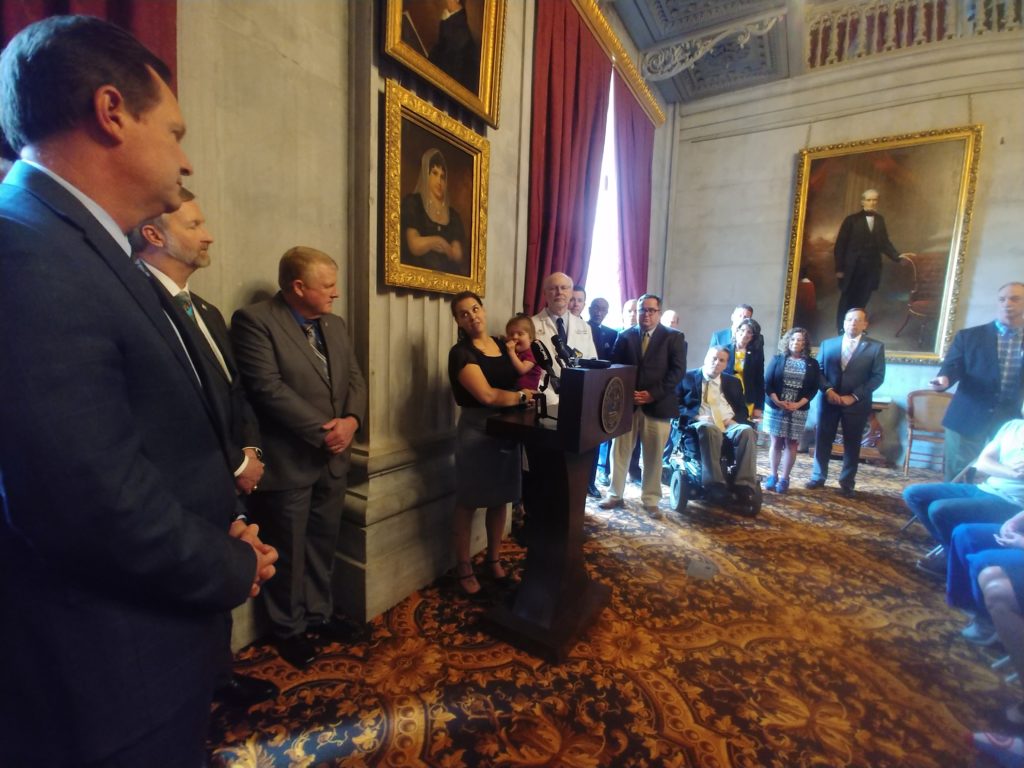
The Tennessee House has voted to use additional tax revenue from online shopping to expand Medicaid for a small but desperate group of patients. But the idea still faces some hurdles, including questions from the state Senate.
The House approved a state budget Wednesday that includes $27 million so children with severe disabilities can be covered by the state’s Medicaid program, even if their parents make too much money to qualify otherwise.
House leadership celebrated the inclusion at a press conference attended by some Democrats, as well as Tori Goddard and her 6-year-old, Zoe. She spent her first 22 months at Vanderbilt University Medical Center dealing with heart complications diagnosed in utero.
Tori quit her job so her daughter — who needs round-the-clock nursing — could remain on Medicaid, known as TennCare in Tennessee.
“I gave up my future for her to have a future,” she said. “And what you guys are giving us back is for us to have a future together, and for me to be able to support her. And that means a lot.”
Tori Goddard says she hopes to go back to working full-time after years of part-time work in order to qualify for Medicaid, which will cover 24-hour care while commercial insurance typically won’t.
Roughly 3,000 children are expected to qualify for the benefits under what’s called a Katie Beckett waiver, named for a a child born
in the late 1970s in Iowa, partially paralyzed and barely able to breath on her own.
Beckett became an inadvertent civil rights pioneer for people living with disabilities because her parents were almost forced to leave her in the hospital, so Medicaid would pay the bills, rather than bringing her home where they really wanted her. Once outside a hospital, she would no longer qualify for government coverage.
Her case was brought to President Ronald Reagan, which prompted Medicaid to change its policy change at the federal level. They said they’d let states extend coverage to disabled kids cared for at home, if they came up with a plan to do so.
Many of them started getting what are called “Katie Beckett waivers,” so middle- and upper-income families could qualify. But at this point, Tennessee has what’s considered the most limited offering in the country, with tight caps on family income.
House lawmakers want to change that. But the money was
not included in Gov. Bill Lee’s budget proposal, and there’s currently a discrepancy with the state Senate. The upper chamber doesn’t want to use new online shopping tax revenue to support a potentially volatile expense, like covering children with major health care needs.
“For the past few years, the finance chairmen in the House and Senate have discussed ways of funding [a Katie Beckett waiver],” says Senate Speaker Randy McNally’s spokesman, Adam Kleinheider. “The key is finding the right mix of revenue sources to ensure you can fund the waiver in a sustainable way.”
Rep. Matthew Hill, R-Jonesborough, helped to shepherd the legislation through the House. And he was adamant to make the benefits unlimited, with no regard to a family’s ability to pay.
“We are going to get this done. We are not going to shortchange these families. We’re not going to put caps on it. We’re not going to have waiting lists,” he said Wednesday. “We’re going to fully fund and get this fully implemented so every child on this list is going to be able to have services.”
WPLN’s Sergio Martínez-Beltrán contributed to this report.


